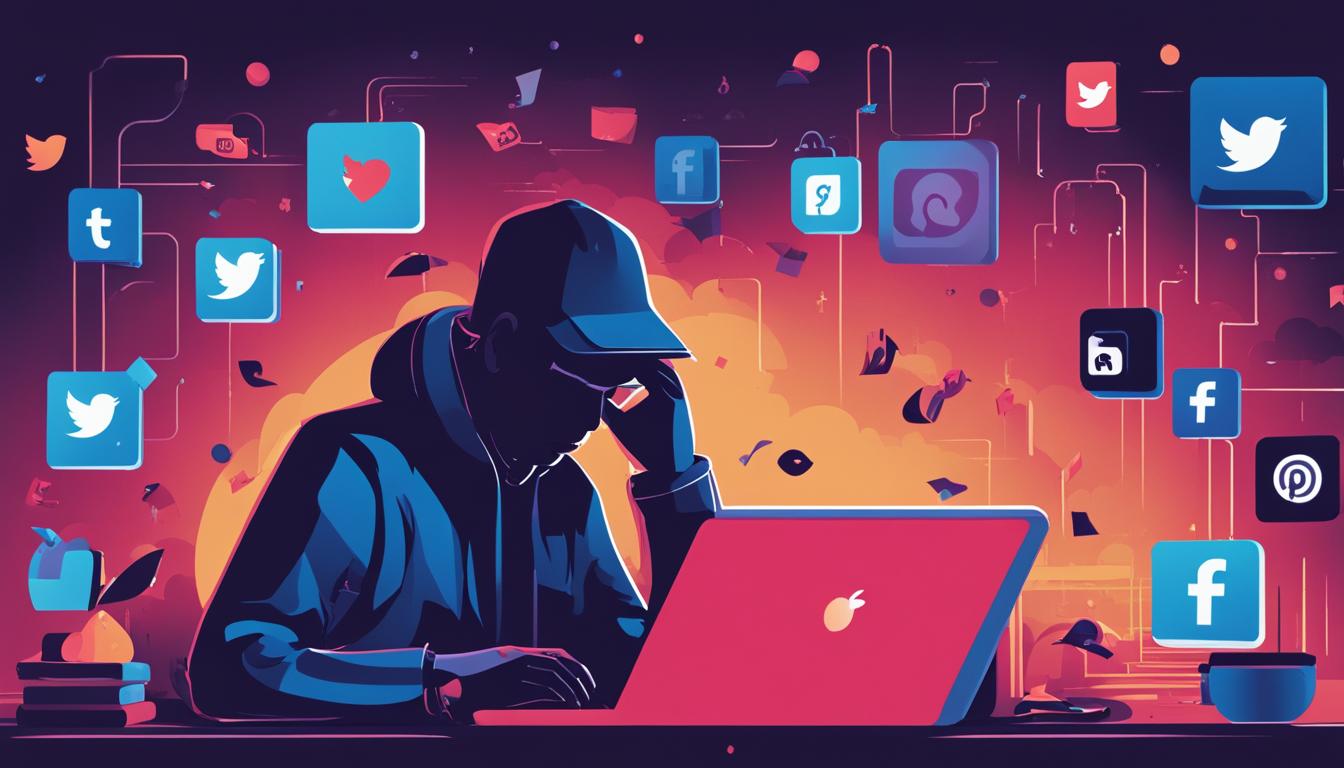Welcome to our article on the impact of social media on mental health. In today’s digital age, social media has become an integral part of our lives, shaping the way we connect, communicate, and perceive ourselves and others. While social media has its benefits, it also has the potential to impact our mental well-being in both positive and negative ways.
Research has shown that social media can enhance connection, increase self-esteem, and improve a sense of belonging. It provides a platform for individuals to express themselves, share experiences, and find support from like-minded individuals. However, it can also lead to tremendous stress, pressure to compare oneself to others, and increased feelings of sadness and isolation.
In this article, we will explore the various ways in which social media impacts mental health. We will delve into the positive effects that social media can have on mental well-being, as well as the negative consequences that excessive use and negative experiences can bring. It is important to understand the potential risks associated with social media consumption and to promote healthy habits for maintaining mental well-being in the digital age.
Key Takeaways:
- Social media can have both positive and negative effects on mental health.
- It can enhance social connections and provide emotional support, but it can also lead to increased stress and feelings of inadequacy.
- Mindful use of social media is essential for maintaining mental well-being.
- Excessive use of social media can contribute to loneliness, depression, and decreased subjective well-being.
- Educating individuals about the potential risks and promoting healthy social media habits is crucial.
The Role of Social Media in Daily Routines
Social media has become an integral part of our daily routines, affecting how we connect, communicate, and interact with others. With the rise of platforms like YouTube, TikTok, Instagram, and Snapchat, people are spending an increasing amount of time on social media. In fact, studies show that the average individual spends around 2.3 hours per day on these platforms. This significant amount of time dedicated to social media highlights its growing influence in our lives.
For many, social media has become a primary source of news, entertainment, and socialization. It provides a platform for self-expression, allowing individuals to share their thoughts, experiences, and creative endeavors with a wide audience. Social media also enables us to connect with friends, family, and acquaintances, bridging distances and fostering relationships. It has transformed the way we communicate, making it easier and more convenient to stay connected with others.
However, the pervasiveness of social media in our daily routines is not without its challenges. Many individuals, particularly young people, express concerns about spending too much time on social media platforms. They recognize the potential for addiction and the negative impact it can have on their well-being. It is important to strike a balance and be mindful of our social media consumption to ensure that it enhances, rather than hinders, our daily lives.
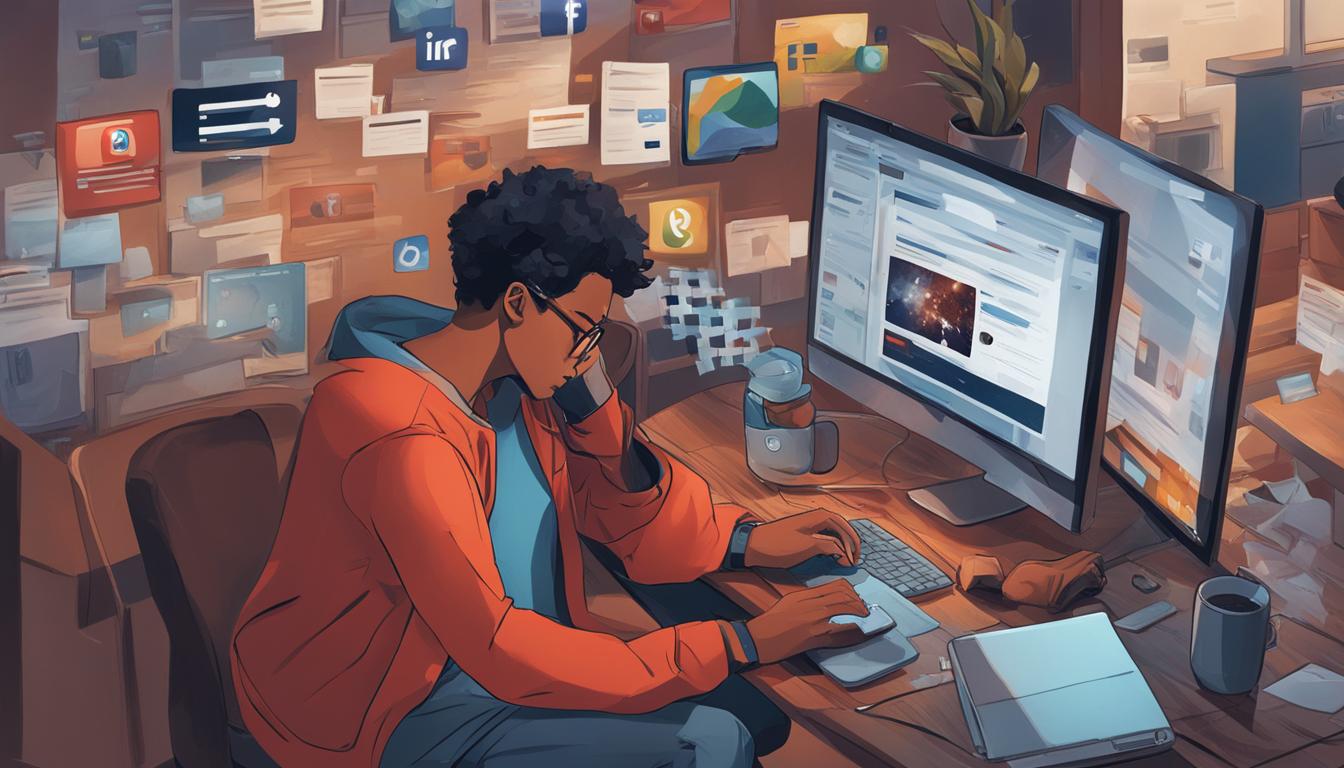
The Influence of Social Media on Behavior
Social media has the power to shape our thoughts, feelings, and behaviors. It can influence our self-esteem, body image, and perceptions of success. Seeing curated and idealized versions of others’ lives on social media can lead us to compare ourselves, often unfavorably, and feel inadequate.
Additionally, social media can impact our mood and emotional well-being. The constant exposure to news, opinions, and commentary can be overwhelming and contribute to feelings of anxiety, stress, and information overload. It is essential to be aware of these potential negative effects and take steps to mitigate them, such as limiting exposure to triggering content or taking breaks from social media when needed.
- Social media can enhance connection and communication.
- It provides a platform for self-expression and creativity.
- It can foster relationships and bridge distances.
- Social media can negatively impact self-esteem and body image.
- It can contribute to feelings of anxiety, stress, and information overload.
Positive Effects of Social Media on Mental Health
Social media platforms have become an integral part of our daily lives, and they can have a positive impact on mental well-being. One of the key benefits is the ability to facilitate social connections. People can connect with friends, family, and even like-minded individuals from around the world. These connections can provide a sense of belonging, support, and emotional well-being. Online communities and support groups can also be found on social media, providing a safe space for individuals to share their experiences, seek advice, and receive emotional support.
Being a part of online communities has helped me find others who share similar experiences and struggles. It has given me a sense of belonging and has made me feel less alone in my journey.
Another positive aspect of social media is the opportunity for rewarding social interactions. Platforms like Facebook, Twitter, and Instagram allow users to engage with each other through likes, comments, and shares. These interactions can foster positive emotions, such as joy and laughter, which can reduce stress and improve overall mental well-being.
Social media also provides a platform for self-expression and creativity. Users can showcase their talents, share their art, or even blog about their experiences. This creative outlet can be empowering and boost self-esteem. Additionally, social media can be a source of inspiration and motivation, as users can follow influencers or role models who share uplifting content and promote positive messages.
The Power of Social Connections
Social connections on social media have the potential to improve mental well-being by providing support, fostering positive emotions, and encouraging self-expression. Online communities and social interactions can help individuals feel connected, supported, and understood. However, it is important to maintain a healthy balance and be mindful of the content we consume and engage with on social media.
- Engage with positivity: Follow accounts that promote positive and uplifting content, such as inspirational quotes, motivational stories, or accounts that focus on personal growth and well-being.
- Limit exposure to negativity: Unfollow or mute accounts that consistently post negative or triggering content. It’s essential to curate your social media feed to prioritize your mental well-being.
- Connect with like-minded individuals: Join online communities or groups that share similar interests or experiences. Engaging in conversations and building connections with others who can relate to your struggles or passions can be incredibly beneficial.
- Practice gratitude: Use social media as a platform to express gratitude and appreciation. Share posts or comments that highlight moments of joy, kindness, or gratitude. Engaging in acts of kindness and spreading positivity can have a profound positive effect on mental well-being.
By harnessing the positive aspects of social media, we can enhance our mental well-being and build meaningful connections. It’s crucial to approach social media with intention, focusing on the positive and supporting our mental health.

Negative Effects of Social Media on Mental Health
Social media has undoubtedly revolutionized the way we connect and communicate with others. However, it is important to acknowledge the negative effects it can have on our mental well-being. Excessive use of social media has been linked to various detrimental effects, including addiction, cyberbullying, and negative mood effects.
Social media addiction is a growing concern in today’s digital age. The constant need to check notifications, scroll through feeds, and seek validation from likes and comments can lead to a compulsive behavior that significantly impacts our mental health. It can contribute to feelings of anxiety, depression, and low self-esteem, as we become overly reliant on social media for our sense of self-worth.
Cyberbullying is another negative consequence of social media use. The anonymity that social media provides can embolden individuals to engage in hurtful and abusive behavior towards others. This can lead to feelings of isolation, shame, and even suicidal ideation for the victims. It is crucial to combat cyberbullying by promoting online kindness and taking measures to protect ourselves and others from such harm.
The mood effects of social media cannot be overlooked. Constant exposure to carefully curated highlight reels of others’ lives can lead to feelings of inadequacy, comparison, and dissatisfaction with our own lives. These negative emotions can contribute to decreased self-esteem and a distorted perception of reality. It is important to remind ourselves that social media often presents an idealized version of people’s lives and that comparing ourselves to others is neither fair nor productive.
The Link Between Social Media and Teenage Mental Health
Teenagers today are growing up in a digital world where social media plays a prominent role in their daily lives. While social media platforms provide opportunities for connection, self-expression, and creativity, they also have a significant impact on teenage mental health. It is crucial to understand the effects of social media on adolescents’ well-being to address and mitigate potential risks.
A key aspect of the impact of social media on teenage mental health is the timing of its introduction. Research indicates that the earlier teens start using social media, the greater the impact on their mental health. This is particularly true for females, who are more likely to experience relational aggression through social media platforms. The pressure to conform, the fear of missing out, and the constant exposure to curated images can amplify issues related to body image, self-esteem, and identity development during a critical developmental period.
Social media can also contribute to increased social comparison and feelings of loneliness. Adolescents may constantly compare themselves to others, cultivating unrealistic expectations and dissatisfaction with their own lives. The highlight reel nature of social media can create a distorted perception of reality, exacerbating feelings of inadequacy and isolation.
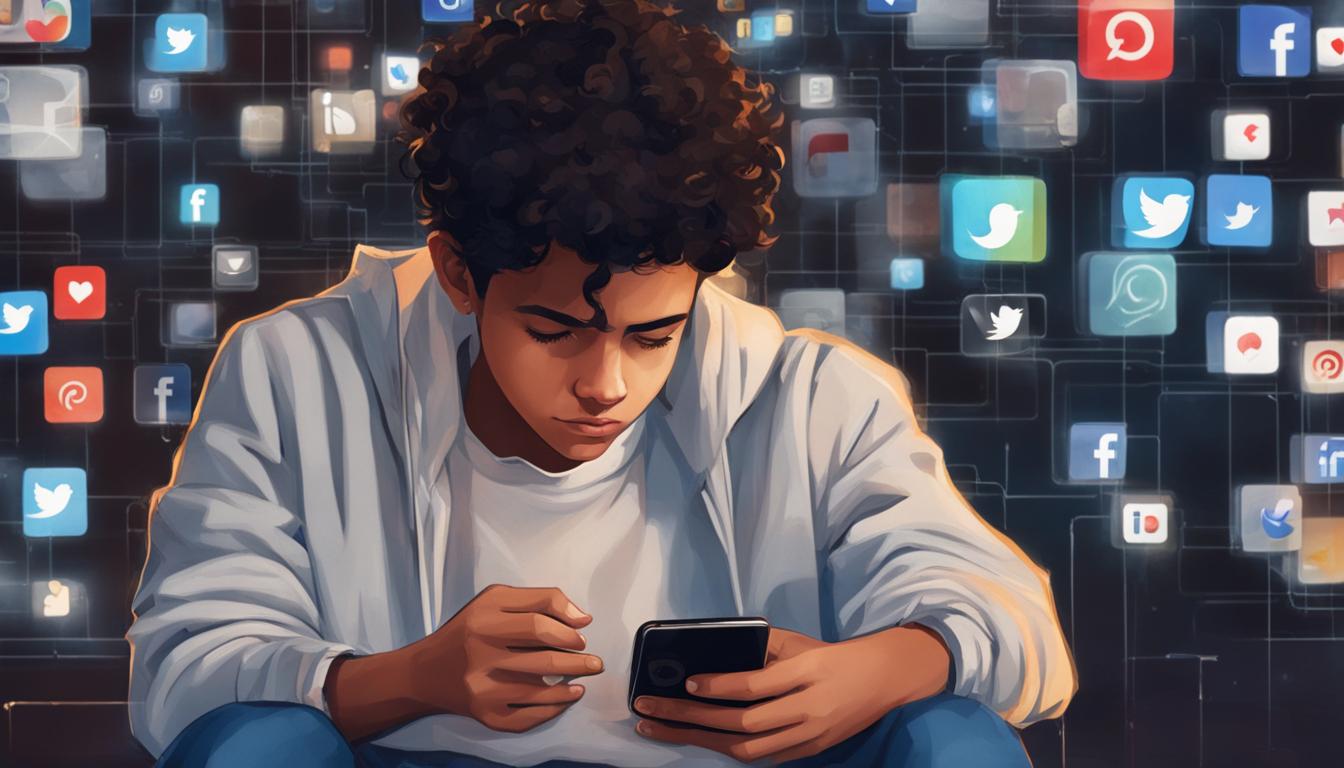
To navigate the impact of social media on teenage mental health, it is essential to promote healthy habits and open communication. Encouraging teens to develop a healthy relationship with social media by setting boundaries, monitoring usage, and engaging in offline activities can contribute to their overall well-being. Parents can play a crucial role by educating themselves about social media platforms, fostering open conversations, and providing support to help their teenagers navigate the challenges that social media can present.
The Impact of Cyberbullying
Cyberbullying is another significant concern related to social media and teenage mental health. The anonymity and distance provided by online platforms can amplify the harmful effects of bullying, leading to increased anxiety, depression, and even suicidal ideation among adolescents. It is crucial to create awareness about the potential risks of cyberbullying and establish preventive measures to ensure the safety and well-being of teenagers in the digital space.
The Potential Risks of Social Media Use
Social media has become an integral part of our daily lives, offering numerous benefits for connecting, sharing, and expressing ourselves. However, it is important to recognize the potential risks associated with social media use, both for our mental and physical health.
Risks to Mental Health
One of the main risks of social media use is its impact on mental health. Excessive use of social media can contribute to feelings of anxiety, depression, and loneliness. The constant exposure to carefully curated images and posts can lead to negative self-comparisons and a distorted perception of reality. Cyberbullying is also a significant risk, with online harassment and trolling causing emotional distress and affecting self-esteem.
“Social media can create a false sense of connection and validation, but it’s important to remember that what we see online isn’t always a true reflection of someone’s life or their actual feelings,” says Dr. Jane Miller, a mental health expert.
In addition, social media addiction is a growing concern. Spending excessive time on social media platforms can lead to neglect of offline relationships, decreased productivity, and an overall sense of dissatisfaction. It is crucial to be mindful of our social media consumption and establish healthy boundaries to prioritize mental well-being.
Risks to Physical Health
While the focus is often on the mental health risks, social media use can also impact our physical well-being. For instance, spending hours scrolling through social media can disrupt our sleep patterns, leading to decreased sleep quality and quantity. This can have a ripple effect on our overall health, contributing to mood disorders, fatigue, and decreased cognitive function.
“The blue light emitted by electronic devices can suppress the production of melatonin, a hormone that regulates sleep,” explains Dr. Sarah Johnson, a sleep specialist. “To promote better sleep, it’s important to limit screen time before bed and create a relaxing bedtime routine.”
Furthermore, excessive social media use can have negative effects on our posture and physical activity levels. Spending prolonged periods hunched over our devices can lead to musculoskeletal issues, such as neck and back pain. It can also discourage physical activity, as time spent on social media often replaces time that could be spent engaging in exercise or outdoor activities.
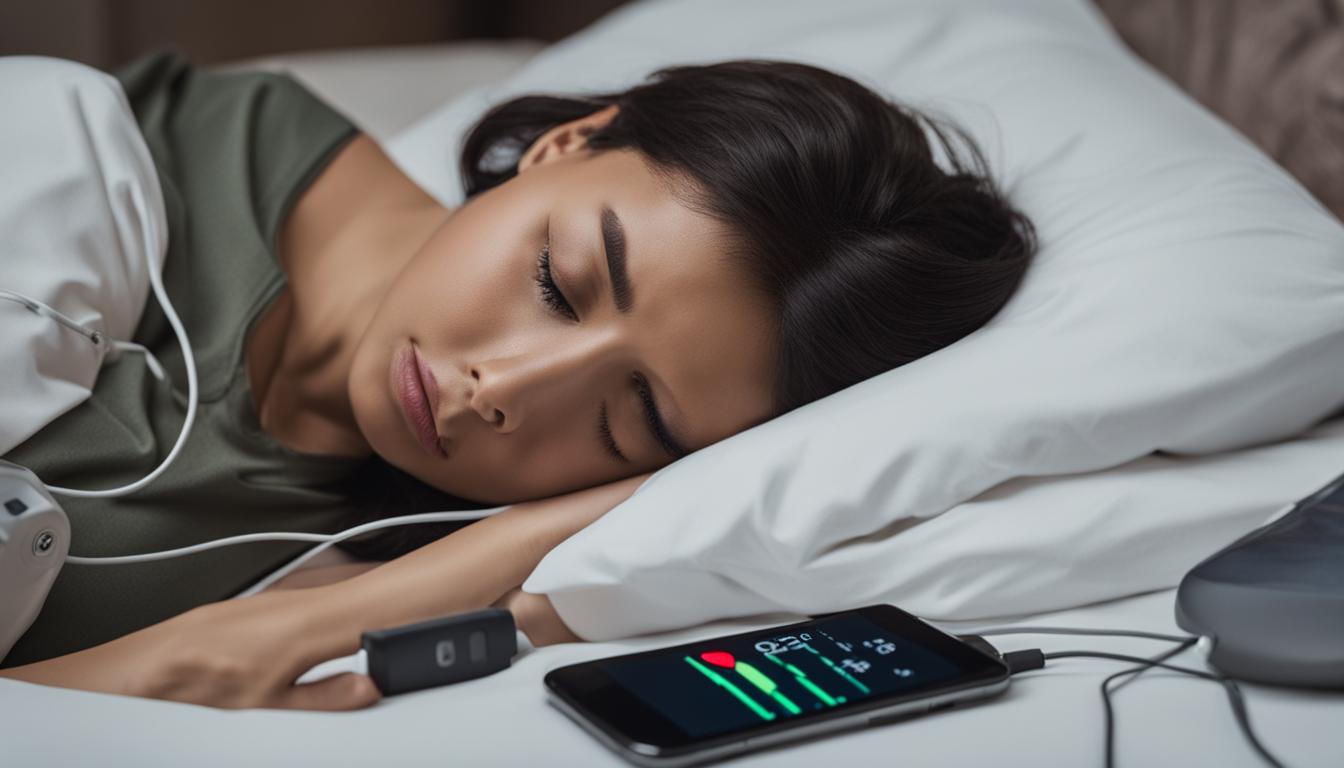
While social media can be a valuable tool for communication and self-expression, it is important to be aware of the potential risks it poses to our mental and physical health. By practicing mindful use, setting boundaries, and prioritizing offline interactions, we can maintain a healthy balance between the digital world and our well-being.
Social Media and Mental Health Awareness
As social media continues to play a significant role in our lives, it is crucial to raise awareness about the potential risks associated with excessive use. While social media can provide opportunities for connection and support, it can also have negative effects on our mental health if not used mindfully.
One of the key risks of excessive social media use is the impact it can have on our self-esteem and mental well-being. Constant exposure to curated and filtered images can lead to feelings of inadequacy and comparison, contributing to anxiety and depression. It is important to remember that what we see on social media is often a highlight reel and not a true reflection of reality.
Another risk is the potential for cyberbullying and online harassment. The anonymity and distance provided by social media platforms can embolden individuals to engage in hurtful behavior. This can have severe consequences on the mental health and well-being of those affected. It is crucial to promote a culture of kindness and empathy online and to report and block individuals engaging in harmful behavior.
“Social media has the power to connect us, but it also has the potential to isolate us,” says Dr. Jane Smith, a mental health expert. “It is important to be mindful of the impact our social media consumption can have on our mental well-being. Taking breaks, setting boundaries, and engaging in offline activities can help maintain a healthy balance.”
By creating awareness about the risks of excessive social media use, we can empower individuals to make informed choices about their online habits. It is important to educate ourselves and others about the potential negative impact on mental health and to promote healthy social media habits. Together, we can foster a more positive and supportive digital environment.

Impact of Social Media on Sleep and Well-being
Social media has become an integral part of our daily lives, but its impact on sleep and overall well-being cannot be ignored. Research has shown that excessive use of social media can have detrimental effects on both the quantity and quality of sleep. Heavy social media use has been linked to decreased, disrupted, and delayed sleep, which can contribute to mood disorders, memory loss, and poor academic performance.
Furthermore, the constant exposure to blue light emitted by screens can interfere with the body’s natural sleep-wake cycle, making it difficult to fall asleep and stay asleep. The addictive nature of social media also leads to late-night scrolling, causing individuals to prioritize virtual interactions over getting enough rest.
To improve sleep and well-being, it is crucial to establish healthy boundaries with social media. Consider implementing a digital curfew, setting aside specific times to disconnect from social media before bedtime. This allows the mind to unwind and prepares the body for a restful night’s sleep. Instead of reaching for the phone, engaging in relaxing activities such as reading a book or practicing mindfulness can promote better sleep quality.
Remember, a good night’s sleep is essential for overall well-being. By prioritizing sleep and consciously limiting social media use, individuals can experience improved mood, increased focus, and enhanced overall well-being.

Addressing Social Media Addiction
Social media addiction is becoming increasingly prevalent in today’s society. Excessive social media use can have a detrimental impact on mental health and overall well-being. It is essential to recognize the signs of social media addiction and take proactive steps to address it.
Symptoms of social media addiction include spending excessive amounts of time on social media platforms, neglecting offline relationships and responsibilities, and experiencing withdrawal symptoms when unable to access social media. Individuals who are addicted to social media may also report feelings of sadness, low self-esteem, and increased anxiety.
To address social media addiction, it is important to establish healthy boundaries and limits. Here are some practical tips:
- Set specific time limits for social media use each day. Use smartphone apps or timers to help you stay accountable.
- Designate social media-free periods, such as during meals or before bedtime, to prioritize offline interactions and ensure better sleep quality.
- Engage in activities that do not involve social media, such as hobbies, exercise, or spending time with loved ones.
- Seek support from friends, family, or a mental health professional. They can provide guidance, encouragement, and resources to help overcome social media addiction.
Remember, addressing social media addiction is a journey that requires patience and self-awareness. By taking steps to limit excessive social media use and seeking support when needed, individuals can regain control over their digital habits and promote their mental well-being.
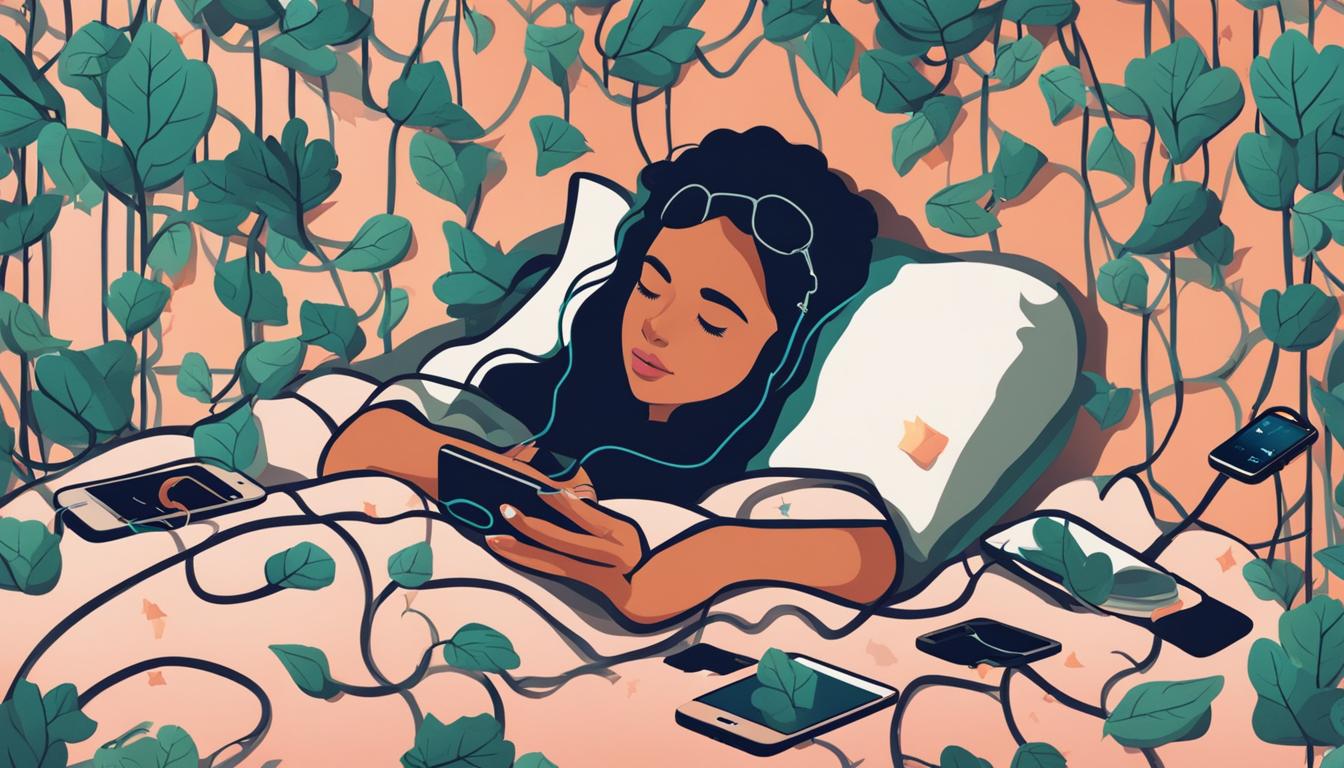
Healthy Social Media Habits for Adults and Teens
Social media has become an integral part of our daily lives, but it’s important to establish healthy habits to maintain our mental well-being in the digital age. Whether you’re an adult or a teenager, here are some tips to help you navigate social media in a positive and mindful way:
1. Monitor your emotions and well-being:
Pay attention to how social media makes you feel. If you notice that it’s causing negative emotions such as jealousy, anxiety, or low self-esteem, it may be time to take a break or limit your usage. Prioritize activities that make you feel happier and more fulfilled offline.
2. Set boundaries and time limits:
Establish healthy boundaries for your social media use. Determine specific times of the day or week when you will check your accounts, and avoid mindlessly scrolling for hours. Setting time limits can help prevent excessive use and ensure that you have a balanced lifestyle.
3. Engage in offline activities and social interactions:
Remember to prioritize real-life connections and experiences. Engage in hobbies, exercise, spend time with loved ones, and connect face-to-face with friends. By balancing online and offline activities, you can foster a sense of fulfillment and improve your overall well-being.
4. Be mindful of comparisons:
Social media often showcases curated and filtered versions of people’s lives, which can lead to unhealthy comparisons. Remember that what you see on social media is not always an accurate representation of reality. Focus on your own journey and celebrate your own achievements, rather than constantly comparing yourself to others.
By implementing these healthy social media habits, you can maintain a positive relationship with social media and protect your mental well-being. Remember, social media should enhance our lives, not detract from them. Use it mindfully and intentionally, and always prioritize your mental health and overall well-being.

Promoting Research and Awareness
Social media’s impact on mental health is a complex and evolving issue. To gain a deeper understanding of this relationship, it is crucial to promote research that explores the positive and negative effects of social media on mental well-being. By conducting comprehensive studies, we can generate valuable insights into the mechanisms through which social media influences mental health.
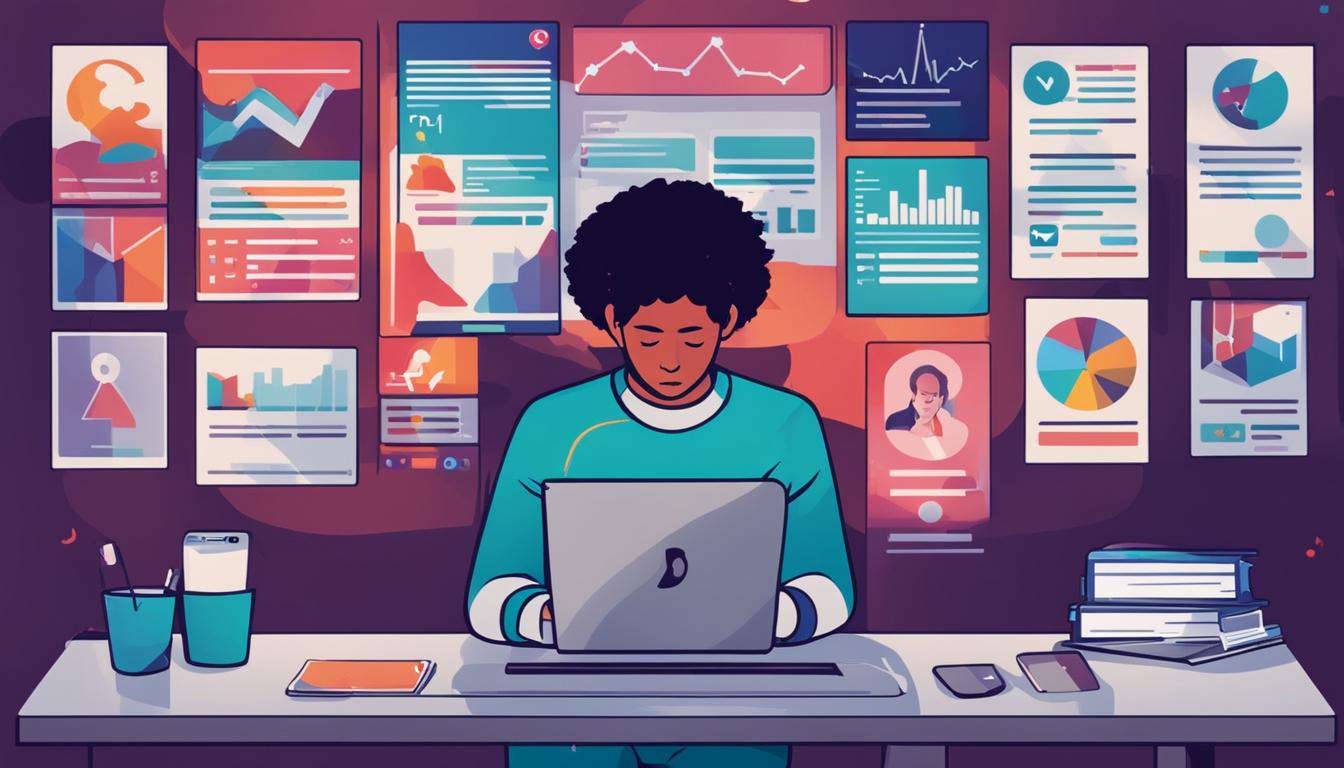
In addition to research, raising awareness about the impact of social media on mental health is essential. Many individuals may not fully understand the potential risks associated with excessive social media use, such as increased anxiety, depression, or cyberbullying. By promoting awareness campaigns, we can educate users about these risks and empower them to make informed choices regarding their social media consumption.
By sharing research findings and promoting awareness, we can collectively work towards creating a healthier social media environment. Through collaboration between researchers, policymakers, and social media platforms, we can develop evidence-based strategies to mitigate the negative effects of social media on mental well-being and promote safe and responsible use.
Conclusion
Social media has become an integral part of our daily lives, and its impact on mental health cannot be ignored. While it offers numerous benefits such as increased social connections and emotional support, there are also significant risks and challenges associated with its use.
Research has shown that excessive social media consumption can contribute to feelings of anxiety, depression, and decreased well-being. The pressure to compare oneself to others, exposure to unrealistic images, and the risk of cyberbullying can all have a negative impact on mental health.
However, by promoting awareness and educating users about the potential risks, we can empower individuals to establish healthy social media habits. Setting boundaries, monitoring the impact on mood, and engaging in offline activities are all important steps in maintaining mental well-being in the digital age.
In conclusion, while social media can enhance our lives by fostering connections and support, it is crucial to approach it mindfully. By prioritizing mental health, promoting awareness, and educating users, we can navigate the digital world in a way that supports our well-being and fosters a positive online experience.
FAQ
How does social media impact mental health?
Social media can have both positive and negative effects on mental health. It can enhance social connections and provide emotional support, but it can also lead to stress, pressure to compare oneself to others, and increased feelings of sadness and isolation.
What are the positive effects of social media on mental health?
Social media can enhance mental well-being by facilitating social connections, peer support, and emotional support. Online communities can reduce stigmatization and increase a sense of belonging. Rewarding social interactions and humor on social media have also been found to reduce stress and improve mental well-being.
What are the negative effects of social media on mental health?
Excessive social media use has been associated with body image dissatisfaction, increased risk of addiction and cyberbullying, negative mood effects, and decreased subjective well-being and life satisfaction. It can also contribute to loneliness, fear of missing out, and decreased academic performance.
How does social media impact teenage mental health?
Social media has a significant impact on teenage mental health, especially when used excessively. It can amplify issues related to body image and self-esteem, contribute to relational aggression, and increase vulnerability to cyberbullying. Early exposure to social media has a greater impact on mental health.
What are the risks of social media use on mental health?
Social media use is associated with increased anxiety, depression, risk of self-harm, disrupted sleep, decreased academic performance, and changes in gut health. Exposure to unrealistic or filtered images and cyberbullying can contribute to mental health issues.
How can we raise awareness about the risks of social media?
By educating individuals about social media literacy and the potential negative impact on mental health, we can promote a more balanced and safe experience. It is important to promote healthy social media habits and encourage mindful use.
How does social media impact sleep and well-being?
Heavy social media use has been linked to decreased, disrupted, and delayed sleep, which can contribute to mood disorders, memory loss, and poor academic performance. Establishing healthy boundaries and limiting social media use before bedtime can improve sleep and well-being.
What are the signs of social media addiction?
Symptoms of social media addiction include spending excessive time on social media, neglecting offline relationships and responsibilities, and experiencing withdrawal symptoms when unable to access social media. Recognizing the signs and seeking help are important.
How can we maintain mental well-being while using social media?
It is important to establish healthy habits such as monitoring the impact of social media use on mood and well-being, setting boundaries and time limits, engaging in offline activities and social interactions, and being mindful of comparing oneself to others. For parents, it is crucial to communicate with teens about social media and set healthy boundaries.
Why is research and awareness important for social media and mental health?
More research is needed to fully understand the impact of social media on mental health, both positive and negative. By conducting comprehensive studies and sharing the findings, we can increase awareness and understanding of the effects of social media. This can inform prevention and intervention strategies to promote healthy social media use.

